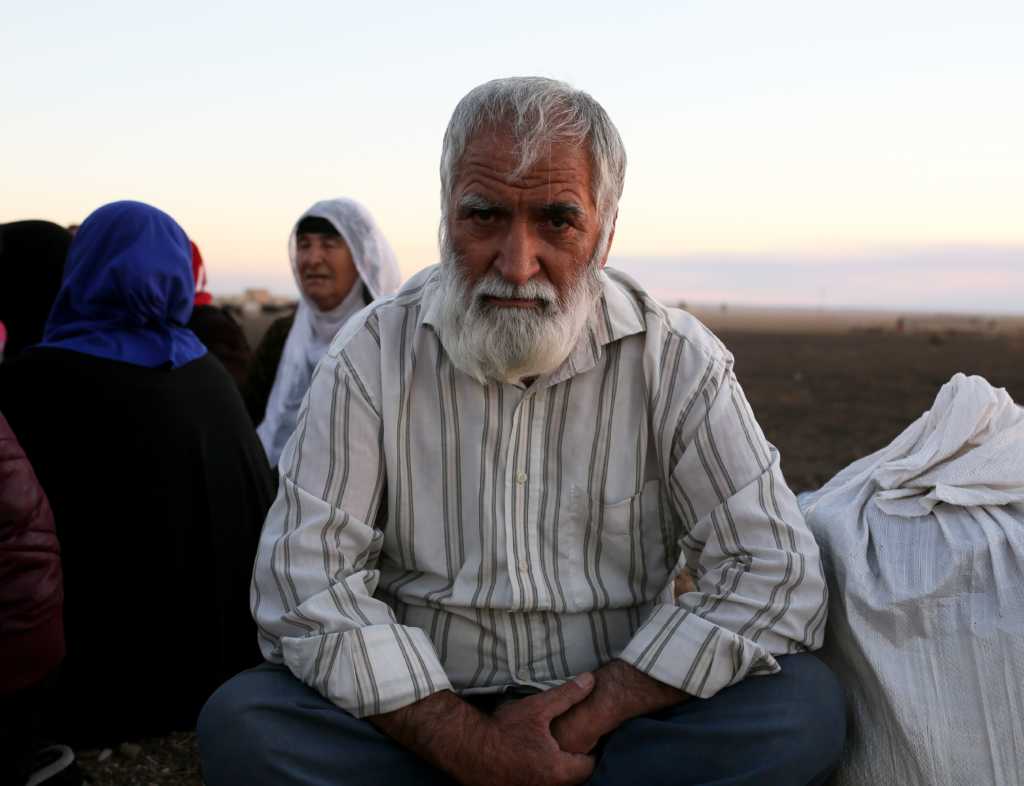As Iraqi and Peshmerga forces begin close in on Mosul, tens of thousands are finding themselves caught in the crossfire. While the military operation is a welcome one, it creates a harrowing situation for the families trapped in the militant controlled city: either hunker down, stay and hope for the best, or flee in the crossfire and hope for the best.
Haitham Sultan Hussein, 61, is the patriarch of one such family who found themselves faced with this impossible decision. He arrived in a displacement camp just this week, and he spoke with Faithwire about why he decided to flee – and he also gave a sobering glimpse into what life has been like for the last two years under ISIS control.
As liberating forces inched closer, Hussein could feel the ground shake. He said the assault had gone on for four straight days, with increasing intensity as each day passed. Finally, it was too much to handle.

“The bombing (and) airstrikes were so intense. We were caught between Daesh and the Iraqi security forces on the ground.”
Daesh is the derogatory Arabic name for ISIS that the terrorist group despises.
“We decided to leave on the fifth day, because the shelling was very close to us. When we left, we just had one bag with us of clothes and some blankets.”

The decision to flee is not that simple. For the past two years, ISIS held a perimeter around the city, preventing people from freely coming or going. There was just no way to know for sure if they would encounter the terrorists on their way out, a certain death sentence.
But staying was incredibly risky, too. Despite best efforts to target militants, innocents aren’t guaranteed safety. Hussein tells Faithwire a nearby family perished when an airstrike inadvertently hit their home.
“We have lived with fear under Daesh for two years and five months. We were scared, but had no choice.”
Fortunately, they were able to slink out in the chaos and begin the trek across the desert Iraqi terrain.
“We reached the Peshmerga who were only about half an hour’s walk away.” The Peshmerga are Kurdish fighters who have been combating ISIS in the northern area of Iraq.

(Photo by Ahmet Izgi/Anadolu Agency/Getty Images)
Hussein worked as a day laborer and his family owned their own home. He came to the displacement camp on Wednesday afternoon from Abu Jarbo’a, a village located in the Shirqat sub-district of Iraq, with five members of his family including his wife Salima, 53, son Nashwan, 20; Ayman, 28 and daughter Diyana, 22.
As of now, the 28-year-old has been separated from the family due to security screening conducted by camp officials.
LIFE UNDER ISIS
The family of five lived under ISIS’s control since it took hold of Mosul in 2014, and offered a glimpse into the horrid living conditions people have endured for two whole years. Hussein said life was like “a prison” with violence, corruption, and no hope.
“There was no work; you could not go out; there was no electricity (and) no clean water.”
“The worse thing under Daesh was that there was no work. You could not go out. Everything was closed. The village was surrounded and we could not move outside to other villages.The schools were closed…the only schools open were the ones run by Daesh and they had books that were full of propaganda and war-training.”
“You could get 50 lashes for shaving your beard or not wearing short trousers. If you stole anything, they would cut off your hand. We were very scared. We lived with terror.”
“We left our village with many other families. One family’s house was hit by an airstrike and everyone died.”
“Now we are in the camp. We can relax. We can drink, we can eat.”
Sadly,”we don’t know how long we will be here; but we have a big hope that there will be a victory for the Iraqi forces. Once that happens, when the government says its safe, and the UN says its safe for us to go home, we will go back.”
According to UNHCR, Haitham was one of the 1,500 people that arrived to their northern Iraq camp between Nov. 1-2, which tripled the camp population within a 24 hour time period, Caroline Gluck, a public information officer with UNHCR Iraq told Faithwire.
Upon this family’s arrival as well as others, they are provided with food, tents, medical assistance and core relief items like mattresses, blankets and stoves, she said.
The data reported on the number of people being displaced due to this recent charge against the terrorist group is varied and ranges between 40,000 people according to Rudaw English to 20,700 by a United Nations Children’s Fund statement issued on Thursday. The UN organization stated that their figure is based on the number of people coming to entry point sites to seek refuge from this new round of fighting which was ignited on Oct. 17.
At the United Nations Refugee Agency’s (UNHCR) Zelikan camp located in the Kurdistan region of Iraq, which is situated north of Mosul, has now become a bedrock of safety for those who have been displaced and disenfranchised from the spoils of war.



